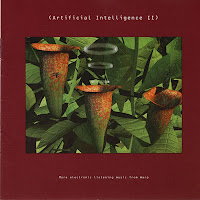Last week was spent listening – mostly – to music that prompts recollections of events, people and situations.
The first was Possessed by the Balanescu Quartet. Possessed is effectively a collection of classical arrangements of Kraftwerk songs – ‘The Robots’, ‘The Model’, ‘Autobahn’ – and a handful of other arrangements, including ‘Hanging Upside-Down’ by David Byrne.

I saw the Balanescu Quartet perform live at the Patti Smith-curated Jimi Hendrix tribute, the last event to take place at the Royal Festival Hall on London’s South Bank before it closed for a swanky refit. They performed four classical adaptations of Hendrix tracks, their version of ‘Foxy Lady’ being the best of the bunch; they certainly providing an accessible counterpoint to other acts on the bill, chiefly Red Hot Chili Pepper bassist Flea who provided ten minutes of looping bass and trumpet that bore little relation to any of the Hendrix back catalogue.
Alexander Balanescu is not simply known for these arrangements of music from other genres; he is an accomplished composer whose scores have adorned film and television soundtracks, but Possessed is what it is – an accessible classical album, but one that fans of Kraftwerk can listen to comfortably, hearing the tracks almost as remixes rather than re-arrangements.
This album has a tragic poignancy for me. The first time I listened to this album was on the Underground. I was stuck on a train a few feet below the streets around Kings Cross, having just left the bright platforms of the Tube station. The train stopped and just sat there, sporadic announcements from the driver that we’d be sat there for a few minutes more and that we’d be on the move very soon.
Me, I couldn’t have cared less. I was enjoying the album and the delay simply meant that I’d be late for work, which at the time was no bad thing. In the end, the train pulled forward to a disused platform beneath Pentonville Road, whereupon we were evacuated up into the bright lights of the early morning. It was only at this point that the chaos, panic and devastation of that day, 7 July 2005, became evident. The album played on in my ears but I just wasn’t listening to it anymore.
Listening to Possessed this week was the first time I’ve attempted to listen to it since that day.
Another album prompting memories to resurface is Warp Record’s Artificial Intelligence II collection of ‘ambient’ electronica from the likes of Autechre, Cabaret Voltaire’s Richard H. Kirk, Speedy J and Link. It was the summer 1994 and I’d just been unceremoniously and unexpectedly dumped by a girl. I spent the afternoon laid up on my parents’ sofa listening, initially, to the Depeche Mode song ‘The Things You Said’ on repeat, the accusatory disappointment of that song perfectly matching my despondency. After ten or twelve listens I decided to put something else on; it was a close call between the embittered rage of Nine Inch Nail’s The Downward Spiral or the much more chilled Artificial Intelligence II compilation. The latter won the afternoon, leading me to a more logical and calm state of mind.

While we’re heading down musical memory lane, I downloaded Radio Musicola by Nik Kershaw this week, the Eighties doyen’s third album. I bought this on cassette from Cash Converters in Colchester in 1997, the day after my first Valentine’s Day ‘with’ my ex-girlfriend. For some reason, we’d decided to spend the evening apart. So I went out into Colchester with my housemates, drank too many Moscow Mules and, well, it didn’t end terribly advantageously. The next day, bleary-eyed, my friend Neil and I went into town late in the afternoon and bought a load of second hand tapes from Cash Converters, one of which was Radio Musicola. While not as good as Kershaw’s first two albums, it nevertheless remains a pop gem. But it definitely sounds better when you’re not hungover.

Some other things on my iPod this week – ‘Horchata’, the new song by Vampire Weekend which they have punted for free this week (verdict : more of the same, only with bigger production and strings); In Rainbows by Radiohead (not a fan of the band per se, and I’m glad I only paid a couple of quid for this when it was made available as a ‘pay what you like’ download, but it is good); and Howyoudoin? by dub-influenced Sarf Londoners Renegade Soundwave. I don’t know why, but I stuck that last album on my dad’s car stereo one Saturday afternoon on the way to pick up my mother and sister. He balked at the messy, sample-heavy songs, but I insisted on listening to it. He turned to me when we were sat waiting at a red light and said ‘I don’t think your mum would like this,’ as the apocalyptic bad-drug-experience (but never exactly precautionary) account detailed on ‘Blast ‘Em Out’ started its slow and edgy journey out of the speakers.




